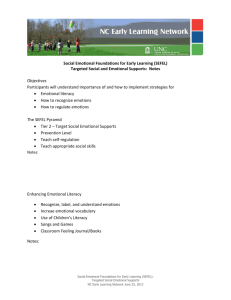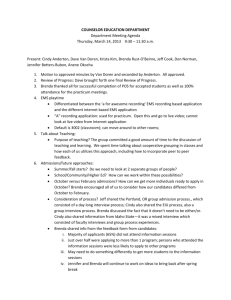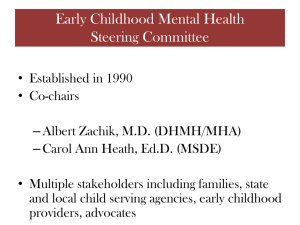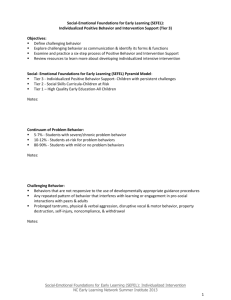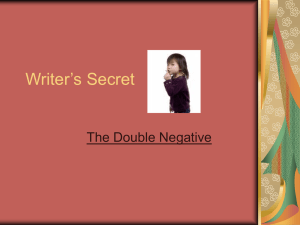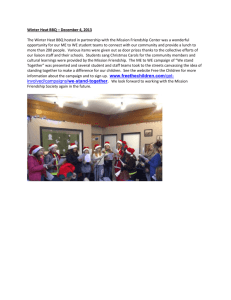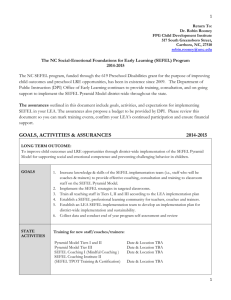Process Agenda-SEFEL Teaching Strategies
advertisement
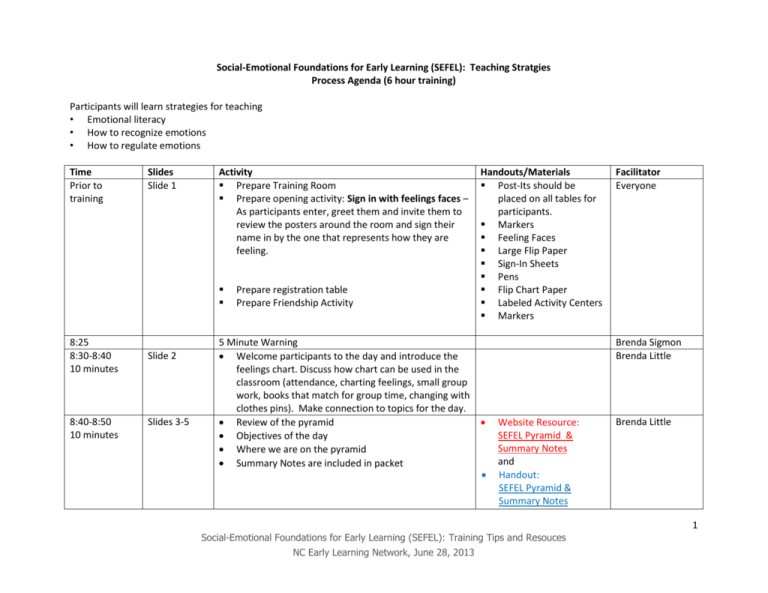
Social-Emotional Foundations for Early Learning (SEFEL): Teaching Stratgies Process Agenda (6 hour training) Participants will learn strategies for teaching • Emotional literacy • How to recognize emotions • How to regulate emotions Time Prior to training Slides Slide 1 Activity Prepare Training Room Prepare opening activity: Sign in with feelings faces – As participants enter, greet them and invite them to review the posters around the room and sign their name in by the one that represents how they are feeling. 8:25 8:30-8:40 10 minutes 8:40-8:50 10 minutes Slide 2 Slides 3-5 Prepare registration table Prepare Friendship Activity 5 Minute Warning Welcome participants to the day and introduce the feelings chart. Discuss how chart can be used in the classroom (attendance, charting feelings, small group work, books that match for group time, changing with clothes pins). Make connection to topics for the day. Review of the pyramid Objectives of the day Where we are on the pyramid Summary Notes are included in packet Handouts/Materials Post-Its should be placed on all tables for participants. Markers Feeling Faces Large Flip Paper Sign-In Sheets Pens Flip Chart Paper Labeled Activity Centers Markers Facilitator Everyone Brenda Sigmon Brenda Little Website Resource: SEFEL Pyramid & Summary Notes and Handout: SEFEL Pyramid & Summary Notes Brenda Little 1 Social-Emotional Foundations for Early Learning (SEFEL): Training Tips and Resouces NC Early Learning Network, June 28, 2013 Time 8:50-8:55 (5) 8:55-9:05 10 minutes 9:05-9:30 25 minutes Slides Slides 6 Slide 7-9 Slide 10 Slide 11-19 9:30-9:45 15 minutes Slides20-24 9:45-9:55 (10) Slide 25 Activity Video – Brain Builders Give overview of targeted social emotional supports • Enhancing emotional literacy • Recognizing emotions and controlling impulses • Problem Solving Skills • Developing friendship skills What is emotional literacy? Activity: Begin by having participants work as a group to define emotional literacy. Have each team read their definition, write down key words on chart, then read CSEFEL definition. Refer to quote in handout ‘Enhancing Emotional Vocabulary in Young Children Activity: Have participants take out the Feeling Words Activity. Instruct them to write down as many words that describe emotions as they can in 30 seconds. Ask, who had at least 5? 10? Go up until reach the highest written down. Give a door prize to the one that has the most. There are 512 feeling words in English language – children without challenges usually think of 10-12 – children w challenges have 3 Enhancing Emotional Literacy Emotional Vocabulary discuss intentional and incidental Feeling Faces Feeling Charts Games Feeling Wheel/Dice/Ring Recognizing Emotions Individualizing Emotions Social Emotional Classroom Supports Promoting positive relationships in the classroom – teachers share information Break Handouts/Materials DVD Website Resource: Enhancing Emotional Vocabulary in Young Children Facilitator Brenda Little Brenda Little Handout: Enhancing Emotional Vocabulary in Young Children Website Resource: Feeling Words Activity Handouts Feeling Words Activity Handout Materials Teachers share props from classrooms Brenda Sigmon Teachers 2 Social-Emotional Foundations for Early Learning (SEFEL): Training Tips and Resouces NC Early Learning Network, June 28, 2013 Time 9:50 Slides 9:55-10:15 20 minutes Slides 26-27 10:15-11:00 45 minutes Slide 28 Slide 29 Slide 30 Slide 31 Slide 32 Slide 33 Slide 34 Slide 35 Activity Ring the 5 minute warning bell and state, “training will resume in 5 minutes.” Make it-Take it Feelings Check-In Using children’s literature to promote emotional literacy Choosing Books to target specific social emotional skills Things to remember when choosing Books Book criteria Activity Book Selection Checklist Book criteria Social Competencies Large group activity: Have each participant review the book, “Pete the Cat”. As a large group discuss how you would use the book in your classroom, using the questions from the Using Children’s Literature handout. You Tube Video of Pete The Cat Books Selection Small Group Activity: Have pairs of 2-3 people review a book. Each group will complete the Book Selection Checklist HO and report back. Book Nook Teacher shares her Book Nook Sample Book Area Video - Jenna 11:00 – 11:15 15 minutes Slide 36 Slide 37 Slide 38 11:15-12:30 LUNCH – Lunch Time -- Transition-Role Play --Slide 39 12:30-12:50 20 minutes Slides 40 Slide 41 Slide 42 Slide 43 Slides 44-47 Handouts/Materials Facilitator Brenda Sigmon Website Resource: Feeling Sign Chart Feeling Faces Ring Website Resource: Using Children’s Literature Handout Using Children’s Literature Materials: Pete the Cat (15) Website Resource: Book Selection Checklist Hand Out: Book Selection Checklist Website Resource: List of Recommended Books Everybody Brenda Sigmon Teachers Website Resource: Book Nook Emotional Regulation Definition of Emotional Regulation Strategies for teaching emotional regulation Ready body language of others and yourself Safe Spaces (Each teachers shares aspects of their Brenda Sigmon Brenda Little and Teachers 3 Social-Emotional Foundations for Early Learning (SEFEL): Training Tips and Resouces NC Early Learning Network, June 28, 2013 Time Slides Slide 48 Slides 49-50 Activity created Safe Space) The Turtle Technique Teachers share how they use Tucker the Turtle in their classrooms Handouts/Materials Facilitator 12:50-1:10 20 minutes Slide 51 Problem Solving Skills Learn problem solving steps Learn problem solving strategies Developing alternative strategies Understand that all solutions have consequences Problem Solving Steps Solution Kit Teachers share classroom strategies Video of Solution Kit Classroom materials Brenda Little and Teachers Slides 58 Materials Flip chart markers Brenda Sigmon Slides 59 Slide 60 Slide 61 Slide 62 Slide 63 Slide 64 Materials Chart Paper Markers Activity Center Labels Brenda Sigmon Slides 52-53 Slide 54 Slides 55-56 Slide 57 1:10-1:40 30 minutes 1:40-2:00 20 minutes Slide 65 Friendship Skills Activity – think about a child who has friends – what characteristics do they have? Jot down 3-5 characteristics. Debrief. Chart answers. Friendship Skills Social Skills Impact Friendship Skills Developing Friendship Skills Games to Develop Friendship Skills Conversation Impact of Social Skills on Friendship Group Activity Have schedule categories on large sticky notes. Assign schedule areas to each person by having them count of by 9s. 1s do arrival, 2s do circle, etc. Instruct the participants to brainstorm strategies for building friendships in their assigned schedule area. Have them write on large sticky notes (one per note page) and post under schedule headings. Debrief – sharing top 1-2 highlights from each, or something that hasn’t been shared. Website Resource: Friendship Skills 4 Social-Emotional Foundations for Early Learning (SEFEL): Training Tips and Resouces NC Early Learning Network, June 28, 2013 Time 2:00-2:10 (15) 2:10-2:20 (10) 2:20-2:35 15 minutes Slides Slides 66 Slides 67-73 Slides 74-76 Slide 77 2:35 – 2:50 15 minutes Slide 78 Slide 79 2:50-3:00 10 minutes Slide 80 Slide 81-82 Slide 83 3:00-3:10 10 minutes 3:10-3:30 20 minutes Activity Break Classroom Activities Super Friends Explain Super Friends Video – Super Friends Slide 84 Slide 85 Slide 86 Slide 87 3:30 Slide 88 Additional resources for teaching social emotional skills Second Step Scripted stories Review content and reference handouts and materials CSEFEL Scripted Stories www.tarheelreader.org Review Review and summarize day 1 and day 2. System Wide Implementation Discuss next steps if interested in system-wide implementation or train-the trainer information NC-DPI SEFEL Newsletter Please share this newsletter with teachers and other interested parties including administration SEFEL ListServ Handouts/Materials Facilitator Teachers Teacher Website Resource: SEFEL Websites Second Step Curriculum Website Resource: Scripted Stories Tip Sheet and Scripted Story Activity Sheet Brenda Little Brenda Little Robin Robin/Vivian Adjourn 5 Social-Emotional Foundations for Early Learning (SEFEL): Training Tips and Resouces NC Early Learning Network, June 28, 2013
